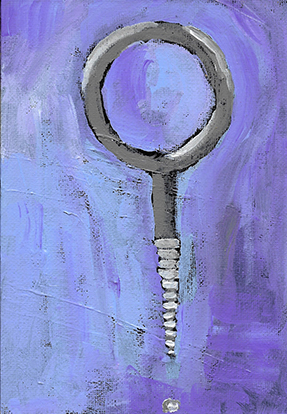Frederick Pollack
At Some Level
Occasionally I like to lead the tour
myself. Give the guides
a day off, with enough notice
that they can plan to go to town in town.
Hopefully guests are conscious
of the honor, but it is six AM,
they’re bleary, and I intimidate somewhat.
The stairs and catwalks
ring under our steps, however tentative;
“Hold onto the railings!” I urge.
I love the view and gorgeous noise
beneath this roof: the enormous yellow claws
wheeling and bowing, the subtle monitors
flashing blue, the belts grinding,
disgorging. An architect
(he says he’s an architect) asks about the roof,
enthusing that the sky wouldn’t seem as large!
(I would have preferred a stolid engineer,
but the guides, I suspect, pack these tours,
and who knows how they tease me?)
Someone timidly mentions
the product; I ignore this. “Notice the machines!”
I cry. “If they turned
and telescoped upward, how frightened you’d be.
But they always point at the material.”
“I think that any animal we pick up,
for any reason,” says an older woman,
“sees our hands as claws.” Her tone is difficult.
“You may be right,” I murmur. Far below,
gates rise; my trucks advance into the day.
“Since I have you up here, I’ll show you
my favorite hideaway.” The mahogany walls
and silence surprise them; so does
the sad okapi head.
“I didn’t kill her,” I assure them.
“I await her resurrection.” Also the portraits:
Father as he appeared to me
after his death, in shadows, changed,
obliquely counseling
against smoking; Mother unlined,
her soft features eager, hair
blown back in the flying chair she dreamed of.Wait for the Movie
The attack he expected on the first day
of middle school came on the second;
two broken ribs, a concussion.
In the hospital, shallowly
breathing, he realized
a latent superpower had emerged:
the superest of all, critique.
This isn’t “insight”; though he hadn’t learned
the word, he knew it means spin,
hype, alibis. There was no mystery
in the boys who had been gunning for him
since third grade: they’re the norm.
He grasped (he had seen videos
of engines) that his adults were a blob
of grease; his assailants, their parents:
pistons. Between episodes
of vomiting, he considered what to do.
Silence, henceforth? Too difficult.
Better to renounce a priori
the means of delusion: the longed-for Page
and accounts. He saw
his role not as a revolutionary
but something like a Desert Father; wondered
if others at the school, the proto-trans,
the retard, the immigrant would sense
his vision and visit. They didn’t.
Frederick Pollack is the author of two book-length narrative poems, The Adventure and Happiness (Story Line Press), and two collections, A Poverty of Words (Prolific Press, 2015) and Landscape With Mutant (Smokestack Books, UK, 2018). Many other poems in print and online journals.
